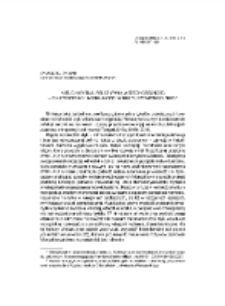- Wyszukaj w całym Repozytorium
- Piśmiennictwo i mapy
- Archeologia
- Baza Młynów
- Nauki przyrodnicze
Wyszukiwanie zaawansowane
Wyszukiwanie zaawansowane
Wyszukiwanie zaawansowane
Wyszukiwanie zaawansowane
Wyszukiwanie zaawansowane

Obiekt
Tytuł: Nieuchwytna, relatywna wszechobecność – o kategoriach moralności w kulturze mongolskiej
Inny tytuł:
Indefinable, relative omnipresence – morality categories in Mongolian culture ; Etnografia Polska 60 Z. 1-2 (2016)
Wydawca:
Instytut Archeologii i Etnologii Polskiej Akademii Nauk
Miejsce wydania:
Opis:
Typ obiektu:
Abstrakt:
The article is focusing on the concept of yos and on its importance in understanding morality in the traditional culture of the Mongols. While the term has been translated into European languages as a habit or custom, it retains a much broader connotation in the Mongolian language, where it implies a vision of a world order against which proper and improper categories of moral behaviour are evaluated. Such evaluations, more than concepts of good and evil, explain the motives influencing behaviour of the Mongols
Czasopismo/Seria/cykl:
Tom:
Zeszyt:
Strona pocz.:
Strona końc.:
Szczegółowy typ zasobu:
Format:
Identyfikator zasobu:
oai:rcin.org.pl:61769 ; 0071-1861
Źródło:
IAiE PAN, call no. P 325 ; IAiE PAN, call no. P 326 ; IAiE PAN, call no. P 327 ; kliknij tutaj, żeby przejść
Język:
Prawa:
Zasady wykorzystania:
Copyright-protected material. May be used within the limits of statutory user freedoms
Digitalizacja:
Institute of Archaeology and Ethnology of the Polish Academy of Sciences
Lokalizacja oryginału:
Library of the Institute of Archaeology and Ethnology of the Polish Academy of Sciences
Dostęp:
Kolekcje, do których przypisany jest obiekt:
- Repozytorium Cyfrowe Instytutów Naukowych > Kolekcje Partnerów > Instytut Archeologii i Etnologii PAN > Publikacje Pracowników i Wydawnictwa IAE PAN
- Repozytorium Cyfrowe Instytutów Naukowych > Kolekcje Partnerów > Instytut Archeologii i Etnologii PAN > Publikacje Pracowników i Wydawnictwa IAE PAN > Czasopisma bieżące
- Repozytorium Cyfrowe Instytutów Naukowych > Piśmiennictwo > Czasopisma/Artykuły
- Repozytorium Cyfrowe Instytutów Naukowych > Kolekcje Partnerów > Instytut Archeologii i Etnologii PAN > Publikacje Pracowników i Wydawnictwa IAE PAN > Czasopisma bieżące > Etnografia Polska
Data ostatniej modyfikacji:
22 gru 2022
Data dodania obiektu:
28 lut 2017
Liczba pobrań / odtworzeń:
2242
Wszystkie dostępne wersje tego obiektu:
https://rcin.org.pl./publication/81480
Wyświetl opis w formacie RDF:
Wyświetl opis w formacie RDFa:
Wyświetl opis w formacie OAI-PMH:
| Nazwa wydania | Data |
|---|---|
| Tangad, Oyungerel, 2016, Nieuchwytna, relatywna wszechobecność – o kategoriach moralności w kulturze mongolskiej | 22 gru 2022 |
Obiekty Podobne
Tangad, Oyungerel
Czeczott, Witold (1846–1929)
Kozłowski, Janusz Krzysztof (1936– )
Wasilewski, Jerzy S.
Skowroński, Leszek
Haslund-Christensen, Henning (1896–1948) Hedin, Sven Anders (1865–1952) Boor, Helmut Anton Wilhelm de (1891–1976) Insel-Verlag.

 INSTYTUT ARCHEOLOGII I ETNOLOGII POLSKIEJ AKADEMII NAUK
INSTYTUT ARCHEOLOGII I ETNOLOGII POLSKIEJ AKADEMII NAUK
 INSTYTUT BADAŃ LITERACKICH POLSKIEJ AKADEMII NAUK
INSTYTUT BADAŃ LITERACKICH POLSKIEJ AKADEMII NAUK
 INSTYTUT BADAWCZY LEŚNICTWA
INSTYTUT BADAWCZY LEŚNICTWA
 INSTYTUT BIOLOGII DOŚWIADCZALNEJ IM. MARCELEGO NENCKIEGO POLSKIEJ AKADEMII NAUK
INSTYTUT BIOLOGII DOŚWIADCZALNEJ IM. MARCELEGO NENCKIEGO POLSKIEJ AKADEMII NAUK
 INSTYTUT BIOLOGII SSAKÓW POLSKIEJ AKADEMII NAUK
INSTYTUT BIOLOGII SSAKÓW POLSKIEJ AKADEMII NAUK
 INSTYTUT CHEMII FIZYCZNEJ PAN
INSTYTUT CHEMII FIZYCZNEJ PAN
 INSTYTUT CHEMII ORGANICZNEJ PAN
INSTYTUT CHEMII ORGANICZNEJ PAN
 INSTYTUT FILOZOFII I SOCJOLOGII PAN
INSTYTUT FILOZOFII I SOCJOLOGII PAN
 INSTYTUT GEOGRAFII I PRZESTRZENNEGO ZAGOSPODAROWANIA PAN
INSTYTUT GEOGRAFII I PRZESTRZENNEGO ZAGOSPODAROWANIA PAN
 INSTYTUT HISTORII im. TADEUSZA MANTEUFFLA POLSKIEJ AKADEMII NAUK
INSTYTUT HISTORII im. TADEUSZA MANTEUFFLA POLSKIEJ AKADEMII NAUK
 INSTYTUT JĘZYKA POLSKIEGO POLSKIEJ AKADEMII NAUK
INSTYTUT JĘZYKA POLSKIEGO POLSKIEJ AKADEMII NAUK
 INSTYTUT MATEMATYCZNY PAN
INSTYTUT MATEMATYCZNY PAN
 INSTYTUT MEDYCYNY DOŚWIADCZALNEJ I KLINICZNEJ IM.MIROSŁAWA MOSSAKOWSKIEGO POLSKIEJ AKADEMII NAUK
INSTYTUT MEDYCYNY DOŚWIADCZALNEJ I KLINICZNEJ IM.MIROSŁAWA MOSSAKOWSKIEGO POLSKIEJ AKADEMII NAUK
 INSTYTUT PODSTAWOWYCH PROBLEMÓW TECHNIKI PAN
INSTYTUT PODSTAWOWYCH PROBLEMÓW TECHNIKI PAN
 INSTYTUT SLAWISTYKI PAN
INSTYTUT SLAWISTYKI PAN
 SIEĆ BADAWCZA ŁUKASIEWICZ - INSTYTUT TECHNOLOGII MATERIAŁÓW ELEKTRONICZNYCH
SIEĆ BADAWCZA ŁUKASIEWICZ - INSTYTUT TECHNOLOGII MATERIAŁÓW ELEKTRONICZNYCH
 MUZEUM I INSTYTUT ZOOLOGII POLSKIEJ AKADEMII NAUK
MUZEUM I INSTYTUT ZOOLOGII POLSKIEJ AKADEMII NAUK
 INSTYTUT BADAŃ SYSTEMOWYCH PAN
INSTYTUT BADAŃ SYSTEMOWYCH PAN
 INSTYTUT BOTANIKI IM. WŁADYSŁAWA SZAFERA POLSKIEJ AKADEMII NAUK
INSTYTUT BOTANIKI IM. WŁADYSŁAWA SZAFERA POLSKIEJ AKADEMII NAUK




































